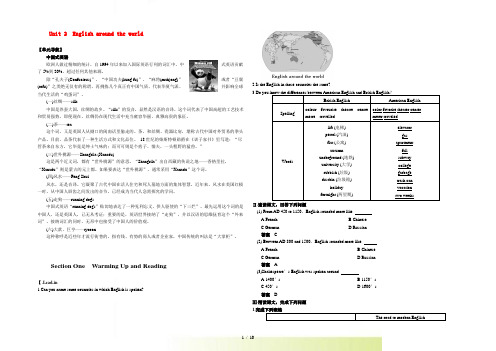高中英语高一人教版必修一 unit2 English around the world教案、教学设计
高中英语 Unit2 English around the world 教材导学 新人教版必修1

Unit 2 English around the world【单元导航】中国式英语欧洲人做过精细的统计,自1994年以来加入国际英语行列的词汇中,中式英语贡献了5%到20%,超过任何其他来源。
除“孔夫子(Confucious)”、“中国功夫(kung fu)”、“麻将(mahjong)”或者“豆腐(tofu)”之类绝无仅有的称谓,再挑拣几个真正有中国气质、代表华夏气派、并影响全球当代生活的“鸡蛋词”。
(一)丝绸——silk中国是养蚕大国,丝绸的故乡。
“silk”的发音,显然是汉语的音译,这个词代表了中国高超的工艺技术和贸易强势。
即便现在,丝绸仍在现代生活中充当雍容华丽、典雅高贵的象征。
(二)茶——tea这个词,又是英国人从拗口的闽南话里偷走的。
茶,和丝绸、瓷器比肩,堪称古代中国对外贸易的拳头产品。
目前,品茶代表了一种生活方式和文化品位。
18世纪的柴斯特顿勋爵在《训子家书》里写道:“尽管茶来自东方,它毕竟是绅士气味的;而可可则是个痞子、懦夫,一头粗野的猛兽。
”(三)世外桃源——Shangrila (Xanadu)这是两个近义词,都有“世外桃源”的意思。
“Shangrila”出自西藏的传说之地——香格里拉,“Xanadu”则是蒙古的元上都。
如果要表达“世外桃源”,通常采用“Xanadu”这个词。
(四)风水——Feng Shui风水,还是音译。
它凝聚了古代中国在活人住宅和死人墓地方面的集体智慧。
近年来,风水在美国红极一时,从中国人唇齿之间发出的音节,已经成为当代人急需探究的学问。
(五)走狗——running dogs中国式英语“running dogs”贴切地表达了一种见利忘义、供人驱使的“下三烂”。
最先运用这个词的是中国人,还是英国人,已无从考证;重要的是,英语世界接纳了“走狗”,并以汉语的思维抚育这个“外来词”。
接纳词汇的同时,无形中也接受了中国人的价值观。
(六)大款、巨亨——tycoon这种称呼是近些年才流行街巷的,指有钱、有势的商人或者企业家,中国传统的叫法是“大掌柜”。
人教版高中英语必修一 Unit2English around the world

人教版高中英语必修一Unit2English around theworld人教版高中英语必修一Unit2English around the world 的单词和词组练习一、基本词汇:n. :1) elevator 电梯2) gas气体;汽油;煤气;毒气3) apartment(美)公寓4) spelling拼写;拼法5) Singapore新加坡6) lorry(英)卡车7) lightning闪电8) cab出租车9) petrol(英)汽油10)voyage航行;航海11)vocabulary词汇;词汇量;词汇表12)identity本身;本体;身份13)Malaysia马来西亚;马来群岛14)accent口音;腔调;重音15)block街区;块;木块;石块adj. :1) latter较后的;后半的;(两者中)后者的2) African非洲的;非洲人的;非洲语言的3) southeastern东南方的4) Midwestern中西部;有中西部特征的5) eastern东部的;东方的6) northwestern西北方的n./v. :1)base以……为基础;基部;基地;基础2)mand命令;指令;掌握;命令;指挥;支配3)request请求;要求n./adj.:1)native本地人;本国人;本国的;本地的2)Danish丹麦语;丹麦的;丹麦人的;丹麦语的3)Spanish西班牙人;西班牙语;西班牙的;西班牙人的;西班牙语的adj/adv.1) straight直接;挺直;直的;笔直的;正直的二、重点词汇:1) use n&v. 用处;使用 usage n.用法;词语惯用法2) express v.表达 expression n.词语;表达;表情3) recognize v. 辨认出;承认 recognition n.认出;识别;承认4) actually adv. 实际上 actual adj.实际上的5) graadually adv. 逐渐地;逐步地 gradual adj.逐渐的;逐步的6) fulently adv. 流利地 fluency n.流利;流畅 fulent adj.流利的7) frequently adv. 常常;频繁地 frequent adj.频繁的;常见的8) office n. 办公室 official adj.官方的三、重点短语:1) because of… 由于;因为because of和 because的区别:beccause of(后接词组或单词)because (作连词,后跟句子)eg:He was late not only because of his illness but also because he missed the train.不仅因为他的病痛而且因为他误了火车他才迟到的。
人教高中英语 必修一 Unit-2-English-around-the-world(共51张PPT)

The seeds come up in spring. 长出来 A few new questions came up at the meeting. 被提出
come up with 意为“提出,
想出”。如:
He came up with a new suggestion.
come across v. 偶遇;无意中发现 come back v.回来;记起;恢复 原状,重新流行
用base的适当形式填空。
1. This book ________ is based on a true story.
2. Mary always ______ bases her ideas on
scientific experiments.
2) present
adj.
当前的, 现在的 (作前置定语)
vt. 赠与, 赠给予, 给, 提出
present sb. with sth.或 present sth. to sb.
把……交给, 颁发, 授予
e.g. Mother presented a gift to me just now.
On his birthday, his friends presented him
with a series of readers /presented a series
of readers to him. (送给他一套读本)
5. Then gradually between about AD 800 and 1150, English became less like German because those who ruled England spoke first Danish and later French. 【翻译】 然后,渐渐地,大约在公元 800年到1150年期间,英语不那么像德 语了,因为那时英国的统治者起初讲丹 麦语后来讲法语。
人教版高中英语 必修一 Unit2 《English around the world---Reading》 课件 (共27张ppt).ppt

Conclusion
Language can change with time.
Language can change
time
when cultures
communicate with
each other.
place
Some people say that Chinese is a much more elegant language, so it is more important for us to master it and it is not so necessary to master foreign language. Do you agree with this opinion and why?
Noah Webster Born: October 16, 1758 Died: May 28, 1843 When Noah was 43, he started writing the first American dictionary. He did this because Americans in different parts of the country spelled, pronounced and used words differently.
3 ____ will tell if Chinese English develop its own identity. A time B people
Thinking
Will Chinese English become one of the world Englishes?
“Only time will tell”.
Choose the main idea of the text.
人教版高中英语必修一Unit2Englisharoundtheworld整个单元课件

15
Reading–III(5m)
Groupwork: Whatcanyoulearnfromthispassage? (discussingroupoffour,thenaskthestudentsto showtheirideas.)
2.Prepareforthenextclass. 3.FinishtheexercisesonWB.
19
20
Period3Learningaboutl anguage
Unit2Englisharoun dtheworld
21
Period3:幻灯片27-48页
Revision(3m)
Match:(Reivewthenewwords)
sIspoketothemjustnow? Helpthestudentsunderstandwhatisaco mmandorarequest.
27
Learningusefulstructure–II(2m)
Makeclearthedifferencebetweencommandsan drequestsandfinishthefollowingexercises:
apartment
autumn
fall
underground(地铁) subway university(大学) college
rubbish(垃圾) garbage
dustbin(垃圾箱) trashcan
holiday
vacation
fortnight(两星期)twoweeks
12
Reading–I(3m)
&
人教版高中英语必修一 Unit2 English around the。world 说课稿

人教版高中英语必修一 Unit2 English around the。
world 说课稿Step 2 Pre-reading预读在本课的预环节,我会让学生先阅读课文标题和开头,引导学生思考本文的主题和内容,并提出问题,激发学生的阅读兴趣。
Step 3 While-reading阅读在阅读环节,我会让学生先快速阅读全文,然后再细读,帮助学生理解文中的重点内容和语言表达方式。
同时,我会引导学生掌握一些阅读技巧,如划重点、圈关键词等。
Step 4 Post-reading课文后续在课文后续环节,我会让学生完成一些阅读任务,如完成课文中的填空题、选择题等,帮助学生巩固所学知识,并提高他们的阅读能力。
Step 5 n讨论在讨论环节,我会让学生分组进行小组讨论,就课文中的主题展开讨论,并让学生分享自己的看法和观点,帮助学生提高口语表达能力。
Step 6 Summary总结在课程总结环节,我会让学生回顾本节课的研究内容和收获,并提出一些问题,帮助学生进一步加深对所学知识的理解和掌握。
七.板书设计本节课的板书设计如下:Unit 2 English around the worldXXXEnglish varietiesBritish English vs。
American English八.教学反思通过本节课的教学,我发现学生对于英语在世界上的发展和各种特色英语的了解有了更深入的认识,并且学生的阅读能力和口语表达能力也得到了提高。
同时,我也发现在教学过程中,有些学生仍然存在害羞不愿开口说英语的问题,我会在以后的课堂中继续引导学生多多开口,提高他们的英语口语表达能力。
人教版高一英语必修一《Unit 2 English around the world》评课稿
人教版高一英语必修一《Unit 2 English around the world》评课稿1. 前言•学科名称:英语•教材版本:人教版高一英语必修一•单元名称:Unit 2 English around the world 本篇评课稿旨在对人教版高一英语必修一《Unit 2 English around the world》进行评析,探讨教材的设计与内容,并提供一些教学建议和反馈。
2. 教材概述《Unit 2 English around the world》是高一英语必修一教材中的一个单元,主要目的是帮助学生了解英语在世界范围内的重要性和多样性。
本单元分为四个部分,分别展示了英语在不同国家和地区的应用和特点。
2.1 第一部分:Listening第一部分主要通过听力练习让学生对英语的应用和变体有初步了解。
•学习目标:通过听力训练,学生能够听懂不同地区的英语口音,提高听力理解能力。
•内容概述:学生将听到来自英国、美国、印度等地不同母语人士的英语发音,通过听力练习,学会区分不同英语口音特点。
•教学评价:本部分设置了多样的听力材料,并提供了配套的听力练习,通过多次反复练习,能够帮助学生更好地理解不同的英语口音,从而提高听力水平。
•建议与反馈:为了进一步提高学生的听力理解能力,可以增加一些真实英语对话的听力材料,并提供更多的听力练习题,引导学生进行听力训练。
2.2 第二部分:Speaking第二部分通过讲话和对话的练习,提高学生的口语表达能力以及交际能力。
•学习目标:通过课堂练习,学生能够模仿并正确运用英语口音和语调,并能够进行简单的英语对话和交流。
•内容概述:学生将练习模仿英美人士的英语发音,进行有关英语使用的对话练习,如问路、订购食物等场景。
•教学评价:本部分通过组织学生进行角色扮演和小组对话的方式,有效地锻炼了学生的口语表达能力,激发了学生的兴趣和参与度。
•建议与反馈:为了提高学生的口语表达水平,可以增加一些生活化实用的对话练习,如购物、旅行等场景,让学生更好地应用所学知识。
人教高中英语必修一unit-2-English-around-the-world-单词讲解
latest adj.最新的;最近的;最后的 lately(=recently) adv.最近;近来
选词填空(latter/later/late/lately/latest) ①Here are Tom and David; the _l_a_t_te_r__ is my
04 come up
come up①_上__来__,走__近_②__被__提_出____ ③__发_生__,__出__现___④__发__芽____
英译汉 (1)A foreigner came up to me and asked me the way to the railway station. 一个外国人走到我面前问我去火车站的路。 (2)The grass is just beginning to come up.
(1)vt. 以……为根据
base... on/upon 把……建立在……的基础上 be based on/upon 以……为基础/依据
(2)n.基部;基地;基础 at the base of 以……为基点;在……的底部
1.你不应该把自己的快乐建立在别人的痛苦之上。
You shouldn’t base your happiness on/upon the other’s sadness.
④The koala(考拉) is native ___to____Australia.
____考__拉__原___产__于__澳__大__利__亚__。________________________
请替换文字内容
点击添加相关标题文字,点击添加相关标题文字,点击添加相关标题 文字,点击添加相关标题文字,点击添加相关标题文字。
人教新课标版高一必修1_Unit_2_English_Around_the_World-reading
8. come up 上来, 走近; 被提出; (植物)发芽; (太 阳)升起 come up to sp 上某地来 come up with 提出 想出 He came up with a good idea in the meeting. 问题在会议中被提出来了。 •The problem came up in the meeting.
Find out the main idea for each paragraph
Time Between about ______ 1150 and AD450 _____
How is English developed?
England and based more on Spoken in ________ German _____.
语动词用单数。
More than one student wants to
go swimming.
高考链接
We advertised for pupils last autumn,
and got ___ 60. A. more than B. more of C. as much as D. so many as
1.Which of the following statement is true? A. Languages always stay the same B. Languages change only after wars
C. Languages no longer change
D. Languages change when cultures change
even if they don’t speak the same kind of English. adj. native land 祖国,故乡 native language 本族语言,母语 be native to The giant panda is native to Sichuan. n. 土著居民 study the habits of the natives even if= (even though) 尽管;即使 Even if the road is full of difficulty, I will never lose heart.
高中英语人教版必修1试题:Unit 2 English around the world 核心素养提升 Word版含答案
核心素养提升(Unit 2)(时间:120分钟满分:150分)第一部分听力(共两节,满分30分)第一节(共5小题;每小题1.5分,满分7.5分)听下面5段对话。
每段对话后有一个小题,从题中所给的A、B、C三个选项中选出最佳选项,并标在试卷的相应位置。
听完每段对话后,你都有10秒钟的时间来回答有关小题和阅读下一小题。
每段对话仅读一遍。
(Text 1)M:What’s the matter,Anne?Do you have a problem?W:Yes,I have the chance to get another job and I don’t know what to do.M:If it’s a better job than your present one,take it.That’s my advice.1.What is the woman thinking about?( C )A.Getting an extra job.B.Doing better in her job.C.Changing her job.(Text 2)W:Excuse me.Where is the White Swan Hotel?M:It’s just over there around the corner.W:Thank you.M:You’re welcome.2.Where did the dialogue probably take place?( A )A.In the street.B.In a hotel.C.At a school.(Text 3)M:I’m staying at home.I want to read a book.W:You’re always reading.You work all the time.M:Games are silly.W:No,they’re not.The headmaster says,“All work and no play makes Jack a dull boy.”3.What does the headmaster want the students to do?( C )A.To work all the time.B.To play at home.C.To work and play.(Text 4)M:Hello,Mary,this is John Smith from the bank.Is Paul there?W:Not yet,John.He phoned me from the office 5 minutes ago to say that he was going to look for a birthday present on his way home.4.Where did Paul plan to go on his way home?( C )A.To the office.B.To the bank.C.To the shop.(Text 5)M:Have you got a single room for two nights?W:Yes.You can have a room facing the sea.M:What’s the price?W:$34 a night with a shower.5.How much will the man spend?( C )A.$34.B.$44.C.$68.第二节(共15小题;每小题1.5分,满分22.5分)听下面5段对话或独白。
- 1、下载文档前请自行甄别文档内容的完整性,平台不提供额外的编辑、内容补充、找答案等附加服务。
- 2、"仅部分预览"的文档,不可在线预览部分如存在完整性等问题,可反馈申请退款(可完整预览的文档不适用该条件!)。
- 3、如文档侵犯您的权益,请联系客服反馈,我们会尽快为您处理(人工客服工作时间:9:00-18:30)。
Unit 2 English around the world学科:English 授课班级:Senior One 执教教师:授课时间:I.教学内容分析本单元通过对“世界英语”这一话题的探讨,以加强学生对英语语言的了解,对当代语言特别是英语发展趋势的了解。
世界在变化、时代在发展、社会在前进,作为人类交流的工具,语言必然随着时代的发展而变化,特别是英语,这一被公认的通用语言的变化更是让人始料不及。
由于英语在世界上的重要地位和它的广泛使用,各国人民在使用英语的过程中不断发展、改进、更新他们使用的英语和本国语。
这种不断的吸收、交融、容纳、创新就形成了各种各样带有某个国家、某个民族、或某个地区特色的英语。
II.教学重点和难点(一)了解英语在世界上的发展状况,以及各种各样带有民族、地域特色的英语。
(二)了解英语和美语的一些基本的差异,像单词的拼写,单词的发音,句式结构等。
尤其是一些常用词。
(三)掌握本单元教学目的和要求中的词汇的用法。
(四)学会英语中有关交际困难的表达法,,如Pardon? I beg your pardon?熟练掌握祈使句及其间接引语的表达法。
III.教学计划第一课时:Warming Up第二课时:Pre-reading, Reading,第三课时:Comprehending, Learning about Language第四课时:Using Language第五课时:Reading and speaking第六课时:WorkbookIV.教学步骤:Period 1 Warming UpTeaching Goals:1.Get Ss to realize that there are some differences between American Englishand British English.2.Get Ss to practise their oral English.Teaching Procedures:Step 1. Leading-inDo you like to see the film? Do you know the other name of film? Yes. It’s movie. Do you know the difference betweens the two words? One is British English and the other is American English. Do you know the differences between them? The differences between the British and American English are spelling, pronunciation, usage and the most important is culture.Step 2. Warming UpPurpose: To make students understand the differences between American and British English1. Pair work:(1) Get Ss to discuss other words that they have learned.(2) Give Ss some words and expressions and have a discussion①Words:英美电影films movies 旁注汽油petrol gas, gasoline图钉drawing thumb tack钞票banknote bill跳远long jump broad jump糖果sweets candy(1)Divide Ss into groups and ask them to make a dialogue.(2)Let Ss practice the dialogue with their partners.Periods 2 Pre-reading and ReadingTeaching Goals:1.Get Ss to learn about English spoken around the world2.Improve Ss’ reading ability, especially the skills of summarizing, word guessing andscanning.3.Get Ss to realize the importance of learning English and of love of our own country.4.Encourage Ss to think and talk in English through communicative tasks and provideSs with chances of cooperation.Teaching Procedures:Step 1. Leading-inPresent Ss with the names of seven countries (the UK, the USA, Canada, Australia, South Africa, Ireland and New Zealand), and ask S s: “Is there any relationship be tween these 7 countries?” Allow Ss to show their own opinions. The answer is that English is the mother tongue to the people in these 7 countries.1.Present Ss with the names of some other countries: India, Pakistan, Nigeria and thePhilippines. Then ask: “Is English spoken in these countries?” Allow Ss to show their own opinions. English is used as an official language in these countries, which is spoken on formal occasions like governing, schooling and news reporting.2.Also in many countries, English is learned as a foreign language, like in China, Japan,France and so on. So although English doesn’t have the most speakers in the world, it is the most popular language all over the world. Today we’re going to read a lesson entitled English around the world.Step 2. Reading1.Skimming:Get Ss to read through the passage and find the topic sentence of each paragraph.Para 1 Today, more people speak English as their first, second or foreign language than ever before.Para 2 Native English speakers can understand each other even if they don’t speak the same kind of English.Para 3 All languages change when cultures communicate with one another.Para 4 English is also spoken as a foreign or second language in South Asia.2. ScanningPurpose: To get Ss to have some details in the text.Read the text quickly and try to get some details from the text. Work in pairs and try to ask and answer questions from the text. Questions can be like these.Q1. How many people spoke English at the end of the 16th century? Where did they live?Q2. Why is English to be spoken in many other countries in the next century?Q3. Which country has the largest number of English speakers?Q4. Why has English changed over time?Q5. Why does India have a very large number of English speakers?Suggested answers:A1. At the end of the 16th century, about five to seven million people spoke English.A2. In the next century, people from England started moving to other parts of the world,so English began to be spoken in many other countries.A3. China may have the largest number of English speakers.A4.Because all languages change when cultures communicate with one another.A5.India has a very large number of English speakers. This is because Britain ruled India from 1765 to 1947.3.Careful reading:Get Ss to read the passage carefully again and meanwhile try to guess the meaning of the following words or phrases: even if, come up, actually, play a role, vocabulary, usage, identity , government.even if=even though: in spite of the fact; no matter whetherplay a role: to be involved in an activityactually: really; in factvocabulary: all the words and phrases you learnsuch as: for exampleelevator: a machine used for moving people or things up and down4.After reading:Allow Ss to discuss with their partners the meaning of the new words. Then let some Ss explain the words. The teacher can give some further explanations if necessary.5.Answer these questions.(1) Do you think what kind of English you learn matters? Why?(2) Why do you think people all over the world want to learn English?(3) Give Ss chances to ask each other questions on the passage.6. Read the passage and choose the correct answer⑴English has /had the most speakers _______.A. now B, when the British ruled many parts of the worldC. in the time of ShakespeareD. in the 12th century .⑵Which of the following sentence is true?A Language always stay the same B. Language change only after warsC .Language no longer changeD .Language change when cultures change⑶From AD450 to 1150,English sounded more like ______.A . French B. ChineseC. GermanD. Russian⑷Shakepeare’s English was spoken around_______.A. 1400’sB. 1150’sC .450’s D. 1600’s⑸Which country has the fastest growing number of English speakers in the world ?A. Australia B ChinaC. IndiaD. BritainSuggested Answers: (1) A (2) D (3) C (4) D (5) BStep 3. Discussion1.After reading the passage, we’ve learned so much about English spoken around theworld. Do you think it’s necessary to have a good knowledge of English? Why do you think so? Please form groups of four and discuss these questions with your partners.(The teacher should walk around to provide any necessary help.)2.Give the students chances to express their opinions freely.3.Summary by the teacher:Through learning this passage, we have got to know that English is becoming more and more popular all over the world now. So English learning seems important to everyone, especially us students of the new century. With China’s entry into WTO, English will play a more important part in business, in tourism, and even in people’s daily life. So it’s no doubt that everyone should have a good knowledge of English. And I hope every one in our class can make an effort to learn English well. But on the other hand, it does n’t mean English is better than Chinese just as some students said just now. We must keep it in mind that one’s mother tongue is the most beautiful language in the world. The reason why we learn English is that we should thus be more capable of building up our country(It’s a good chance to lead the students to love our own country as well as to learn English well.)Step 4. Words and expressions1. Native English speakers can understand each other even if they don’t speak the same kind of English .以英语作为母语的人,即使他们讲的英语不尽相同,也可以相互交流。
